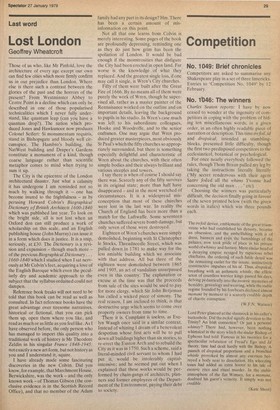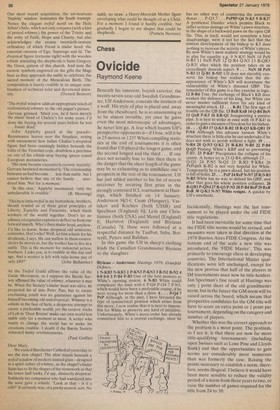Competition
No. 1049: Brief chronicles
Competitors are asked to summarise any Shakespeare play in a set of three limericks. Entries to 'Competition No. 1049' by 12 February.
No. 1t)46: The winners
Charles Seaton reports: I have by now ceased to wonder at the ingenuity of competitors in coping with the problem of hiding ten miscellaneous words, in a given order, in an often highly readable piece of narration or description. This time trefoil, id and dropsical, intended as stumblingblocks, presented little difficulty, though the first two predisposed competitors to the ecclesiastical, botanical or psychological.
For once nearly everybody followed the rules, though Thom Braun pulled my leg by taking the instructions literally literally (`My secret rendezvous with their agent Sartre foiled all the whims Yvonne had concerning the old man . . . ' etc).
Choosing the winners was particularly difficult, the decision finally going in favour of the seven printed below (with the given words in italics) which win three pounds each.
The trefoil device, emblematic of the great triumvirate who had established his dynasty, became an obsession, and the embellishing with it of dress, banners and even the furnishings of the palaces, now took pride of place in his private world of whimsy and fantasy. Mere titular head of a decaying empire ravaged by rapacious rebel chieftains, the ordering of such futile detail was the remaining outlet for the innate, instinctively constructive impulses of his id. Thus, dropsical, breathing with an asthmatic whistle, the effete scion of countless warrior kings passed his days, delving pedantically into the esoteric mysteries of heraldry, genealogy and weaving, while the stable regime founded by his forebears declined almost moment by moment to a scarcely credible depth of chaotic corruption.
(W.F.N. Watson)
Lord Peter glanced at the shamrock in his caller's buttonhole. Did the trefoil signify devotion to the Trinity? An Irish connection? Or just a personal whimsy? There had, however, been nothing whimsical in the story which the titular Bishop of Ephesus had told. Famous in his twenties for a spectacular refutation of Freud's Ego and Id theory, time had dealt hardly with the Bishop. A paunch of dropsical proportions and a bronchial whistle provoked by almost any exertion betrayed a body near to dissolution. His wheezing tones had added an extra horror to his tale of esoteric rites and ritual murder. In the stable atmosphere of the flat Wimsey, for a moment, doubted his guest's veracity. It simply was not credible.
(Kate Short)
Our most recent acquisition, the art-nouveau 'Nativity' window, dominates the South transept. Notice the elegant trefoil motif on the Holy Infant's halo, which not only conjures (with a hint of period whimsy) the power of the Trinity and the unity of Faith, Hope and Charity, but also acknowledges the arcane twentieth-century orthodoxy of which Freud is titular head: the essential oneness of Ego, Superego and Id. The dropsical figure (extreme right) with the wooden whistle attending the shepherds is Saint Gregory the Gross, patron of this church. And note the esoteric symbols engraved on the gifts the Magi bear as they approach the stable to celebrate the sacred moment of the Miraculous Birth. The composition is barely credible in its unique combination of technical eclat and devotional inten
sity. (Gerard Benson)
'The trefoil window adds an appropriate touch of ecclesiastical whimsy to the old pagan's picture.' Gervase grinned. 'Mind you, he'd been merely the titular head of Chalice's for some years. I'd done the buying for several years before he was . found dead.'
John Appleby gazed at the pseudoRenaissance horror over the fireplace, noting with amusement how Julian Chalice's dropsical figure had been cunningly hidden beneath the folds of the Venetian cope, doubtless a purchase on one of his whistle-stop buying sprees round European monasteries.
'His taste became excessively esoteric recently'. Gervase hesitated momentarily.'The relationship between us had become. . . less than stable, but I cannot believe that any of the family . murdered him. Not for a moment.'
'In this case,' Appleby murmured, 'only the
unbelievable is credible.' (B. Mooring) 'This here little trefoil in my buttonhole, brothers, should remind us of them great principles of Liberty. Equality and Fraternity, which binds workers of the world together. Don't let no whimsy of capitalist exploiters deflect us from our forward march. Who's their titular head, anyhow, I'd like to know. Some dropsical oia aristocrat, comrades, that's who! Well, let him whistle for his dividends, I says. He can wallow in them esoteric circles he moves in, but the worker has to live in a stable. This is the moment for industrial action, brothers. I asks you, is it credible in this day and age, that a worker is left with take-home pay of
only f130?' (John Ballantine)
As the Trefoil Guild affirms the value of the Guide Movement, so I suppose the Barrie Society affirmed the value of whimsy, whatever it may be. When the Society's titular head was alive, he projected his id into Peter Pan; but to create everlasting youth was no guarantee against his himself becoming old and dropsical. Whimsy is a whistle in the face of facts, a desperate attempt to create a preferable world; yet the esoteric tricks of Lob in 'Dear Brutus' make our own world less stable only for a moment at most. A writer who wants to change the world has to make his creations credible. I doubt if the Barrie Society attracted many revolutionaries.
(Paul Griffin) Dear Mary,
. . We visited Barchester Cathedral yesterday to see the new chapel. The altar stands beneath a trefoil window of modern stained glass — designed in a spirit rather of whimsy, as the chapel's titular Saint has to fit the shapes of the stonework so that his lower half looks, I'd say, distinctly dropsical. Suddenly my companion who had wandered into the nave gave a whistle. 'Look at that — is it a crib?' It certainly was, of a pretty esoteric sort. No stable, no straw, a Henry-Mooreish Mother figure enveloping what could be thought of as a Child. For a moment I found it hardly credible, but gradually I began to see shapes that could be
shepherds ... (Pamela Newton)







































 Previous page
Previous page